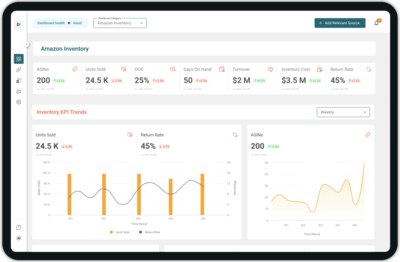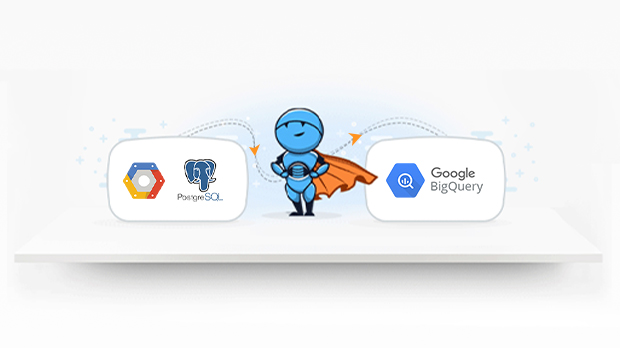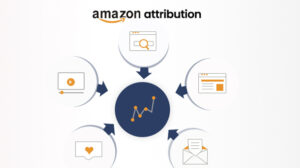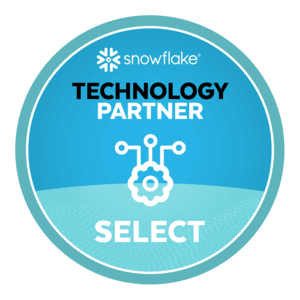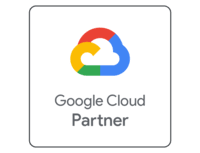Do you want a quick and simple way to transfer data from GCP PostgreSQL to Google BigQuery? If yes, then you can migrate your data with an efficient ETL tool: Daton.
Businesses need to utilize their data to make data-driven decisions and stay ahead of increasing competition. The data from different tools require fast and secured storage. But the cost to build and maintain a scalable and secure physical storage solution is a lot. So, now the companies are using cloud databases like PostgreSQL. Although, extracting, replicating and managing data from these databases is complex. Hence cloud platforms like Google Cloud Platform (GCP) have made a solution to handle PostgreSQL databases. GCP PostgreSQL provides easy access and control on your PostgreSQL database.
Nowadays, companies are reducing the time & effort of reporting and analyzing their business data from several databases and cloud storage. They use ETL tools like Daton to replicate data from these Cloud platforms to data warehouses like Google BigQuery, where analysts get a consolidated view for faster and more accurate reporting.
Why integrate GCP PostgreSQL to Google BigQuery
Data savvy enterprises use cloud storage solutions like Google Cloud Platform to manage their databases. These storage solutions help collaboration and data consolidation, especially when multiple teams work in several offices across the globe. You will get automatic database replication, backing by secure servers, and reduced data loss and theft. Combine data from GCP PostgreSQL with other databases like COGS, Amazon Aurora, sales sheets to simplify data analysis and reporting. However, manual data integration is complex and time-consuming, often creating inaccurate reports. Thus, companies resort to ETL tools like Daton to transfer data from GCP PostgreSQL to Google BigQuery. It is a highly automated ETL Tool that easily replicates data from several data sources to cloud data warehouses without coding.
GCP PostgreSQL Overview
GCP PostgreSQL is a fully-managed database service that helps you set up and maintain PostgreSQL databases on the Google Cloud Platform (GCP). It provides standard features like high availability with automatic failover, a rich API, encryption at rest and in transit, automatic backups, and advanced logging, and monitoring. GCP PostgreSQL runs on Google’s Second-Generation computing platform. Databases running on the Second-Generation platform are 7x faster and have 20x more storage capacity. GCP PostgreSQL also ensures high availability using low-level storage data synchronization using regional persistent disks.
Google Bigquery Overview
Google BigQuery is the first serverless data warehouse service that was available in the market. A database administrator architects the schema and optimize the partitions for performance and cost in a Google BigQuery environment. This cloud service automatically scales to fulfill any demands of a query. Google BigQuery service offers an excellent pricing model based on the amount of data processed by incoming queries, not on the storage or the compute capacity for processing queries. The best part about using Google BigQuery is that you can instantly load data to the service as soon as you start using it. The primary requirements are a mechanism to load data into the data warehouse and the ability to write SQL queries.
How to Replicate GCP PostgreSQL to Google BigQuery
There are two ways in which you can replicate GCP PostgreSQL to Google BigQuery warehouse.
Build Your data pipeline – Building an in-house data pipeline needs a lot of experience, time and manpower with higher chances of errors. You need to extract data using GCP PostgreSQL APIs & then connect it properly with the Google BigQuery data warehouse.
Use Daton to integrate GCP PostgreSQL & Google BigQuery – Using Daton to integrate GCP PostgreSQL & Google BigQuery is the fastest & easiest way to save your time and efforts. Leveraging a cloud data pipeline like Daton simplifies and accelerates the time to build automated reporting to a great extent.
Configuring data replication on Daton only takes a few minutes and a few clicks. Analysts do not have to write any code or manage any infrastructure, yet they can get access to their Amazon ads data in a few hours. Daton’s simple and easy to use interface allows analysts and developers to use UI elements to configure data replication from GCP PostgreSQL data into Google BigQuery.
Daton Takes Care of:
- Authentication
- Rate limits,
- Table creation, deletion & reloads
- Refreshing access tokens,
- Sampling,
- Historical data load,
- Incremental data load,
- Notifications
and many more important functions for data analysts to focus on analysis rather than worry about the data replication process.
Steps to Integrate GCP PostgreSQL with Daton

- Sign in to Daton
- Select GCP PostgreSQL from Integrations page
- Provide Integration Name, Replication Frequency, and History. Integration name would be used in creating tables for the integration and cannot be changed later
- You will be redirected to GCP PostgreSQL login for authorizing Daton to extract data periodically
- Post successful authentication, you will be prompted to choose from the list of available GCP PostgreSQL Ad accounts
- Select required tables from the available list of tables
- Then select all required fields for each table
- Submit the integration
Reasons to explore Daton for GCP PostgreSQL to Google BigQuery Integration
- Faster Integration of GCP PostgreSQL to Google BigQuery– GCP PostgreSQL to Google BigQuery is one of the integrations Daton can handle very fast and seamlessly. By following few steps, you can easily connect GCP PostgreSQL to Google BigQuery.
- Robust Scheduling Options: allows you to schedule jobs based on their requirements using a simple configuration step.
- Low Effort & Zero Maintenance – Daton automatically takes care of all the data replication processes and infrastructure once you sign up for a Daton account and configure the data sources. There is no infrastructure to manage or no code to write.
- Data consistency guarantee and an incredibly friendly customer support team ensure you can leave the data engineering to Daton and focus instead of analysis and insights!
- Enterprise-grade data pipeline at an unbeatable price to help every business become data driven. Get started with a single integration today for just $10 and scale up as your demands increase.
- Support for all major cloud data warehouses including Snowflake, Google BigQuery, Amazon Redshift, Oracle Autonomous Data Warehouse, PostgreSQL and more.
- Flexible loading options allows to you optimize data loading behavior to maximize storage utilization and easy of querying.
- Enterprise-grade encryption gives your peace of mind
- Support for 100+ data sources – In addition to GCP PostgreSQL, Daton can extract data from a varied range of sources such as Sales and Marketing applications, Databases, Analytics platforms, Payment platforms and much more. Daton will ensure that you have a way to bring any data to Google BigQuery and generate relevant insights.
- What is Daton and how does it help with data replication from GCP PostgreSQL to Google BigQuery?Daton is an efficient ETL tool that can transfer data from GCP PostgreSQL to Google BigQuery without coding. It simplifies and accelerates the data replication process by providing a user-friendly interface, robust scheduling options, low effort and zero maintenance, data consistency guarantee, and support for various data sources and warehouses.
- What are the benefits of using GCP PostgreSQL as a database service on the Google Cloud Platform?GCP PostgreSQL is a fully-managed database service that helps you set up and maintain PostgreSQL databases on the Google Cloud Platform. It provides standard features like high availability with automatic failover, a rich API, encryption at rest and in transit, automatic backups, and advanced logging, and monitoring. GCP PostgreSQL runs on Google’s Second-Generation computing platform, which offers faster performance and more storage capacity.
- What are the advantages of using Google BigQuery as a data warehouse for analytics?Google BigQuery is a serverless data warehouse service that scales automatically and offers a pricing model based on the data processed by queries. It allows you to load data instantly and write SQL queries to analyze it. It also supports various data formats, integrations, and machine-learning capabilities.
- How can you transfer data from GCP PostgreSQL to Google BigQuery?There are two ways to transfer data from GCP PostgreSQL to Google BigQuery: Build your own data pipeline using GCP PostgreSQL APIs and Google Cloud Storage (GCS). You need to extract data from GCP PostgreSQL using the COPY TO command, transform it to match BigQuery’s schema and format, upload it to GCS, and then load it to BigQuery using the bq command-line tool or the web UI. Use Daton, a cloud data pipeline tool that simplifies and automates the data replication process. You just need to configure the data sources, frequency, and history in Daton’s user interface, and it will handle the rest. Daton also supports integrating with other data sources and data warehouses.
- How can I connect GCP PostgreSQL to Google BigQuery using Daton?You can connect GCP PostgreSQL to Google BigQuery using Daton in a few simple steps. First, you need to sign up for a Daton account and select GCP PostgreSQL as the source and Google BigQuery as the destination. Then, you need to provide the integration name, replication frequency, and history. Next, you need to authenticate with your GCP PostgreSQL credentials and select the accounts you want to replicate. Finally, you need to choose the tables and fields you want to sync and start the replication.


